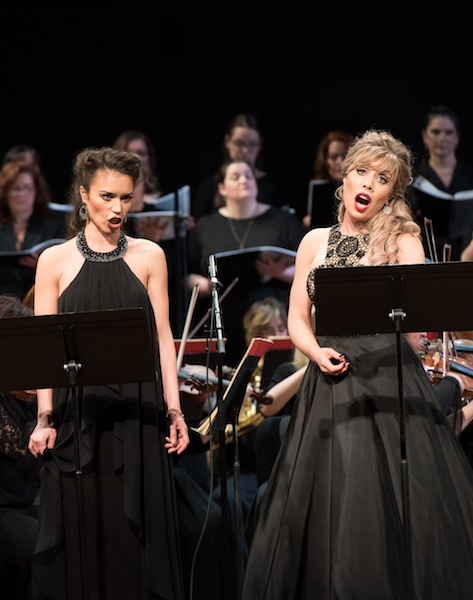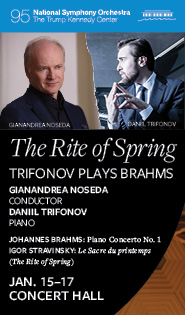Sisters make blazing debuts in Washington Concert Opera’s “Maria di Rohan”

Marina Costa-Jackson (right) and Ginger Costa-Jackson performed in Donizetti’s “Maria di Rohan” for Washington Concert Opera Sunday night. Photo: Dan Lassell
In the dusty corners of the operatic repertory are many works worth resurrecting but resistant to staging because of their absurd plots.
Antony Walker must have a wish list of such pieces, and his Washington Concert Opera presented one such work, Donizetti’s Maria di Rohan, Sunday evening, to conclude its season at Lisner Auditorium. It may not be completely unknown, like the newly reconstructed L’Ange de Nisida, but it is rarely heard.
The libretto is based loosely on the life of Marie de Rohan, a scheming French noblewomen married to or sexually involved with a series of influential men at the court of Louis XIII. Scholar William Ashbrook singled out this opera as the strongest example of Donizetti’s role in making Romantic melodrama the dominant type of Italian opera in the mid-19th century. In his melodramas, Donizetti wrote arias “more concerned with the revelation of character than with vocal display” and preferred duets and ensembles to solo arias, qualities borne out in this performance.
Marina Costa-Jackson, a young soprano who wielded her powerful voice like a photon cannon, made a formidable company debut in the title role. She was unsteady in a few brief sections of florid runs, but her dramatic sound had heart-stopping potency, including soaring up to gleaming high notes. She was able to compress her sound for a tender duet with the tenor, Chalais, at one point, but without really mollifying the steely edge to the voice.
Walker cast Ginger Costa-Jackson, sister of Marina, as Armando di Gondi, a brazen, swaggering character revised and extended as a trouser role for mezzo-soprano in the revision of the opera for Paris. Her voice shared many of the same imposing, even aggressive qualities as her sister, most notably a mannish tone in the chest voice that matched a severe, yet mocking stage presence. These are both voices that can easily fill a venue larger than Lisner Auditorium.
Baritone Lester Lynch made an equally arresting company debut as the Duca di Chevreuse, secretly married to Maria. His earlier contributions were suave and refined in tone, as the character is grateful to the Conte di Chalais, who has helped him get out of prison. When he learned that Chalais is a rival for his wife’s affection, Lynch turned spiteful, deploying considerable vocal bluster to depict the character’s vengeful anger.
The weak link in the cast was tenor Norman Reinhardt as the Conte di Chalais. He produced the most dulcet tone in the cast, that aspect of bel canto singing missing from this night of generally bombastic vocalism. He tended to finesse the role’s high notes rather than lunging at them heroically, but this approach failed him at one point in the second act, where almost no sound came out at the top. After that, Reinhardt made a false entrance, entering the stage but then confusedly realizing he was to sing his lines off stage.
As the Visconte di Suze and de Fiesque, respectively, bass Timothy Bruno and baritone Efraín Solís supported ably in the ensembles that are the lifeblood of this opera. Adam Caughey and Andrew Bawden filled out comprimario roles when they were not singing with the chorus, which featured most prominently in the first act.
Walker conducted the critical edition of the score, published by Ricordi, with bouncing enthusiasm, an always calm hand at the helm despite the occasional singer mishaps. The orchestra featured fine solo contributions from English horn player Joseph de Luccio and oboist Fatma Duglar. The four horn players were a strong ensemble in the moody, soft opening of the third act, but the woodwind tuning turned sour too often.
Washington Concert Opera presents Gounod’s Sapho on November 18, 2018, and Rossini’s Zelmira on April 5, 2019. concertopera.org; 202-364-5826.




Posted Feb 26, 2018 at 12:10 pm by Laura Youens
Excellent critique!